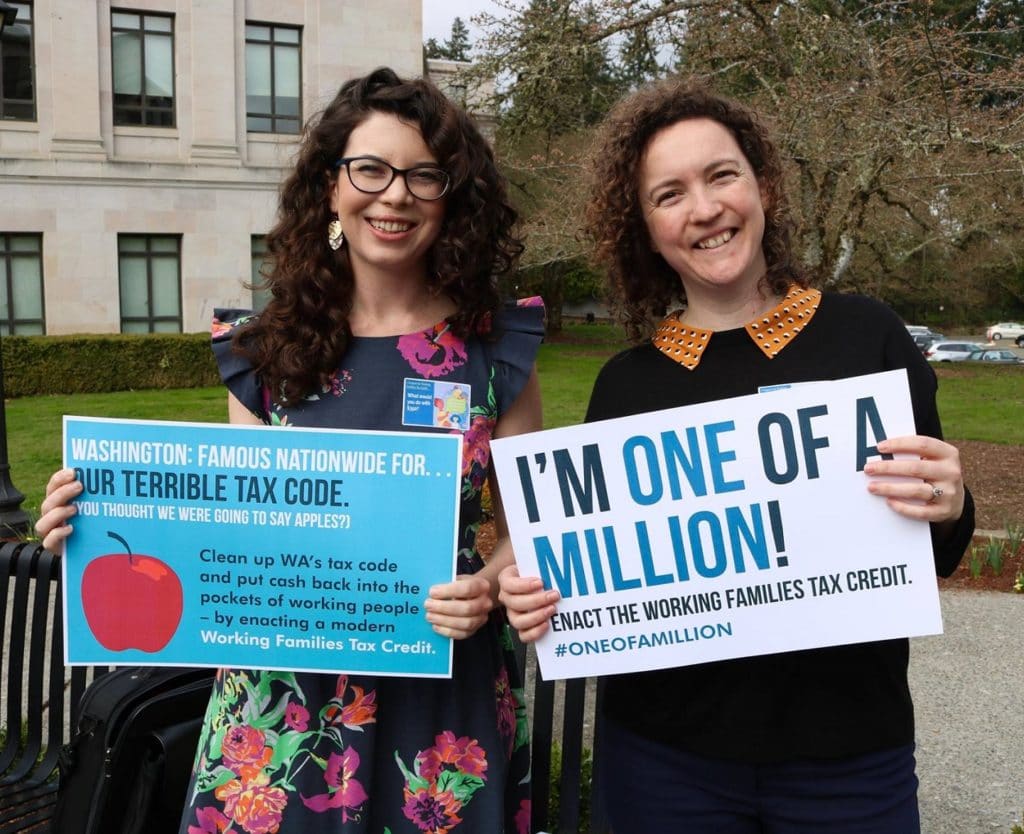Momentum is building across the United States to put cash back into the pockets of people who work hard for low wages. The federal Earned Income Tax Credit (EITC) and state versions of the credit – like Washington state’s proposed Working Families Tax Credit – give workers better opportunities for economic security, mitigate the effects of historically racist policies, and strengthen economies. These credits also fulfill an alternative vision to Trump’s 2017 tax law, which funneled public money to corporations and the wealthy at the expense of people with moderate and low incomes.
The EITC is one of the most successful federal anti-poverty programs in the country. It provides people who earn low wages with a boost to their incomes in the form of a tax refund. Research shows that the kind of income boost the EITC provides is linked to improved health outcomes for kids and better well-being for families. Building out the current federal program and ensuring states have their own meaningful versions of the program is a commonsense idea that is gaining in popularity.
Federal tax credit proposals would help lift up millions of Washingtonians
A growing number of Democratic presidential candidates, including Kamala Harris, Cory Booker, and Pete Buttigieg, have supported expanding and building on the federal EITC across the nation. Just this week, Democratic presidential candidate Julián Castro proposed his own plan, the People First Economic Plan for Working Families.
Proposals have also been introduced in both chambers of Congress. These policy solutions would benefit millions of Washingtonians, helping people keep up with the skyrocketing cost of living.
The Working Families Tax Relief Act (introduced by Sens. Sherrod Brown and Michael Bennet, and Reps. Dan Kildee and Dwight Evans), for example, would expand the EITC for families with and without children, making many younger workers without children eligible for the EITC for the first time. More than 2.3 million Washingtonians would benefit from this bill. Forty-six senators, including Senators Murray and Cantwell, have co-sponsored the Working Families Tax Relief Act.
Check out “States Improving Tax Credits for Working Families” by the Center on Budget and Policy Priorities and “Understanding Five Major Federal Tax Credit Proposals” by the Institute for Taxation and Economic Policy for more information.
Other proposals include the Cost-of-Living Refund Act (introduced by Sen. Sherrod Brown and Rep. Ro Khanna); the LIFT the Middle Class Act (introduced by Sen. Kamala Harris); the Rise Credit (proposed by Sen. Cory Booker); the Boost Act (introduced by Rep. Rashida Tlaib); and the EITC Modernization Act (introduced by Rep. Bonnie Watson Coleman).
Parts of these federal EITC proposals are likely to move in the fall if some members of Congress keep pushing to extend temporary tax breaks for businesses that will soon expire. That’s because supporters of the EITC proposals are likely to advocate for the credit expansions to be included in any legislation extending these business tax breaks – ensuring that people with low and moderate incomes don’t get left behind like they did in the 2017 federal tax law.
More states are removing economic barriers for many working families
In 2019 alone, six states enacted new or expanded versions of state-level EITCs, providing an income boost to millions of workers who are struggling to make ends meet. Among those six states are our West Coast neighbors California and Oregon.
Twenty states have enacted new or expanded state EITCs since 2013. These expansions will supplement the federal EITC’s well-documented, long-term benefits for children, improve racial equity, and boost the nation’s economic prospects.
In California, lawmakers expanded eligibility for that state’s EITC and created a credit for families with young children. These changes are expected to boost income for one million Californians. In Oregon, lawmakers prevented the state’s EITC from expiring in 2020 and raised the credit’s value, improving the financial security of 900,000 Oregonians.
Overall, 20 states have enacted new or expanded state EITCs since 2013. According to the Center on Budget and Policy Priorities, these expansions will supplement the federal EITC’s well-documented, long-term benefits for children, improve racial and gender equity, and boost the nation’s economic prospects.
Even more states have proposed such policies but haven’t gotten across the finish line yet. Washington state is among them.
Washington’s Working Families Tax Credit is good for our state
This past legislative session, Washington state’s Rep. Debra Entenman and Sen. Joe Nguyen put forward commonsense proposals for our state to enact a modern, expanded Working Families Tax Credit. The Working Families Tax Credit is foundational to reversing the harmful impacts of our state’s worst-in-the-nation tax code, which makes those with the least pay six times more of their income in state and local taxes than the wealthiest 1%. Our broken tax code is especially harmful to communities of color, who have long been excluded from economic opportunity because of racist policies like redlining and employment discrimination. The Working Families Tax Credit would be a small but meaningful step forward in addressing racial inequity and rebalancing income inequality.
Thousands of people testified, told their stories to the media, emailed or called their lawmakers, and spoke out in support of these proposals. But the Working Families Tax Credit proposals ultimately stalled.
Let’s enact this commonsense proposal in 2020
Our West Coast neighbors have the right idea. Dozens of federal lawmakers have the right idea. Countless Americans who are calling on lawmakers to take real steps to address income inequality have the right idea.
It’s Washington state’s turn to be part of this wave of change. Legislators in our state need to enact a modern, expanded Working Families Tax Credit in 2020.

